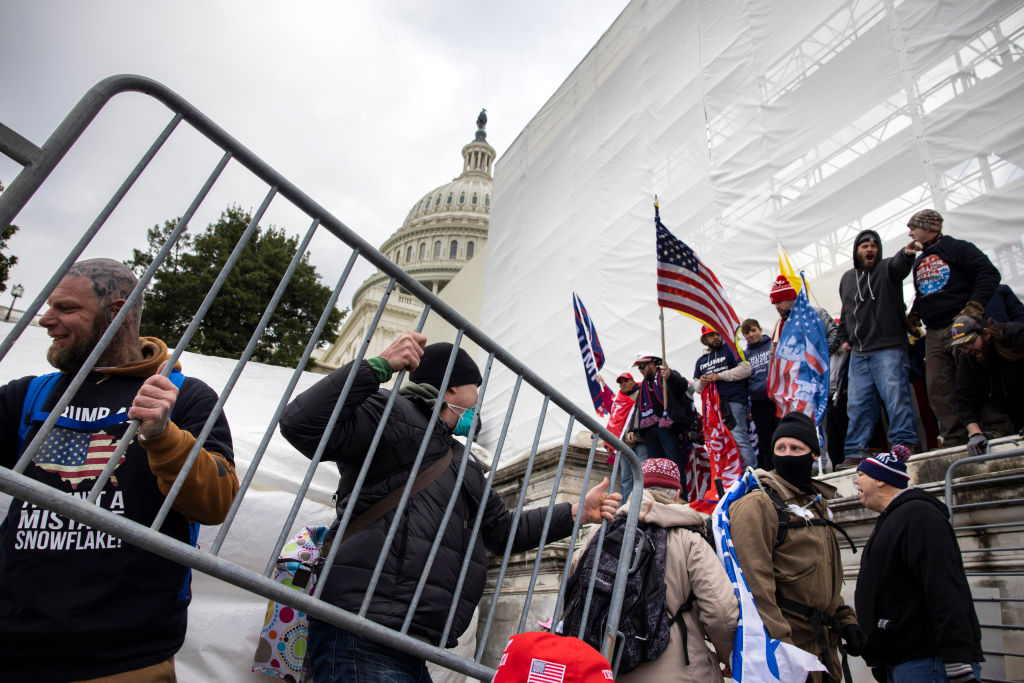How Facebook became a 'key vector' in the lead-up to Jan. 6


A free daily email with the biggest news stories of the day – and the best features from TheWeek.com
You are now subscribed
Your newsletter sign-up was successful
An investigation from The Washington Post and ProPublica has revealed how Facebook groups "swelled" between Election Day and the Jan. 6 Capitol riot with hundreds of thousands of sometimes-violent posts attacking the 2020 election and President Biden's victory.
The deluge averaged at least 10,000 posts a day, and turned the social network's group communities into "incubators" for fraudulent claims, and the social network itself into a "key vector" for spreading the narratives that led to the attack, writes the Post.
Furthermore, Facebook's efforts to monitor toxic election content in its groups were "ineffective" and "started too late," the Post notes, especially considering the network dissolved a task force meant to police communities ahead of the 2020 vote shortly thereafter.
The Week
Escape your echo chamber. Get the facts behind the news, plus analysis from multiple perspectives.

Sign up for The Week's Free Newsletters
From our morning news briefing to a weekly Good News Newsletter, get the best of The Week delivered directly to your inbox.
From our morning news briefing to a weekly Good News Newsletter, get the best of The Week delivered directly to your inbox.
The result — "during the nine increasingly tense weeks that led up to Jan. 6, the groups were inundated with posts attacking the legitimacy of Biden's election, while the pace of removals noticeably slowed," the Post writes. Content removals picked up again after the Capitol attack, though many groups and their posts nonetheless "remained on the site for months after."
"Facebook took its eye off the ball in the interim time between Election Day and January 6," one ex-Facebook employee who worked on the groups task force told the Post. "There was a lot of violating content that did appear on the platform that wouldn't otherwise have."
Other workers flagged the fact that a special team was even needed to remove problematic group content as a failure. Said another task force employee: "You could make a good argument that this should have already been done."
A company spokesperson denied Facebook slowed efforts to combat political misinformation or violence after the election, and rejected the notion that Facebook is at all responsible for the riot. Read more at The Washington Post.
A free daily email with the biggest news stories of the day – and the best features from TheWeek.com
Brigid Kennedy worked at The Week from 2021 to 2023 as a staff writer, junior editor and then story editor, with an interest in U.S. politics, the economy and the music industry.
-
 Political cartoons for February 21
Political cartoons for February 21Cartoons Saturday’s political cartoons include consequences, secrets, and more
-
 Crisis in Cuba: a ‘golden opportunity’ for Washington?
Crisis in Cuba: a ‘golden opportunity’ for Washington?Talking Point The Trump administration is applying the pressure, and with Latin America swinging to the right, Havana is becoming more ‘politically isolated’
-
 5 thoroughly redacted cartoons about Pam Bondi protecting predators
5 thoroughly redacted cartoons about Pam Bondi protecting predatorsCartoons Artists take on the real victim, types of protection, and more
-
 Labor secretary’s husband barred amid assault probe
Labor secretary’s husband barred amid assault probeSpeed Read Shawn DeRemer, the husband of Labor Secretary Lori Chavez-DeRemer, has been accused of sexual assault
-
 Trump touts pledges at 1st Board of Peace meeting
Trump touts pledges at 1st Board of Peace meetingSpeed Read At the inaugural meeting, the president announced nine countries have agreed to pledge a combined $7 billion for a Gaza relief package
-
 NIH director Bhattacharya tapped as acting CDC head
NIH director Bhattacharya tapped as acting CDC headSpeed Read Jay Bhattacharya, a critic of the CDC’s Covid-19 response, will now lead the Centers for Disease Control and Prevention
-
 Witkoff and Kushner tackle Ukraine, Iran in Geneva
Witkoff and Kushner tackle Ukraine, Iran in GenevaSpeed Read Steve Witkoff and Jared Kushner held negotiations aimed at securing a nuclear deal with Iran and an end to Russia’s war in Ukraine
-
 Pentagon spokesperson forced out as DHS’s resigns
Pentagon spokesperson forced out as DHS’s resignsSpeed Read Senior military adviser Col. David Butler was fired by Pete Hegseth and Homeland Security spokesperson Tricia McLaughlin is resigning
-
 Judge orders Washington slavery exhibit restored
Judge orders Washington slavery exhibit restoredSpeed Read The Trump administration took down displays about slavery at the President’s House Site in Philadelphia
-
 Hyatt chair joins growing list of Epstein files losers
Hyatt chair joins growing list of Epstein files losersSpeed Read Thomas Pritzker stepped down as executive chair of the Hyatt Hotels Corporation over his ties with Jeffrey Epstein and Ghislaine Maxwell
-
 Judge blocks Hegseth from punishing Kelly over video
Judge blocks Hegseth from punishing Kelly over videoSpeed Read Defense Secretary Pete Hegseth pushed for the senator to be demoted over a video in which he reminds military officials they should refuse illegal orders
